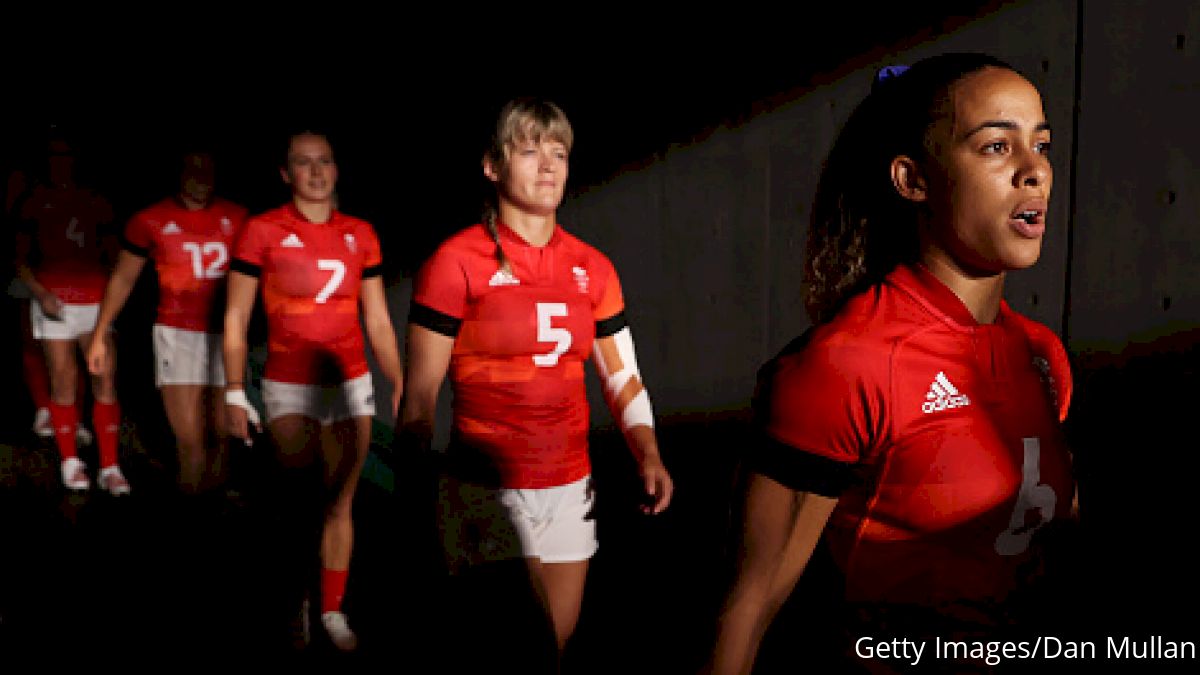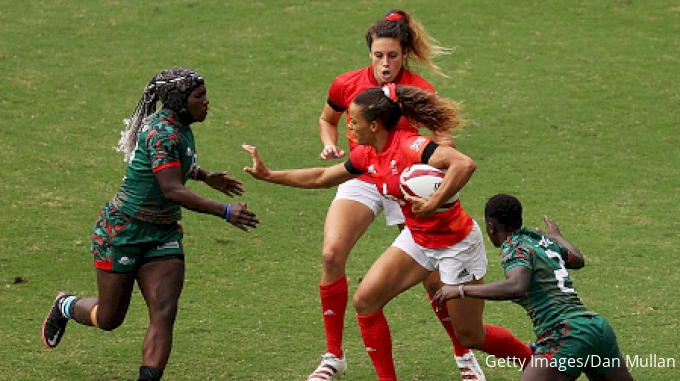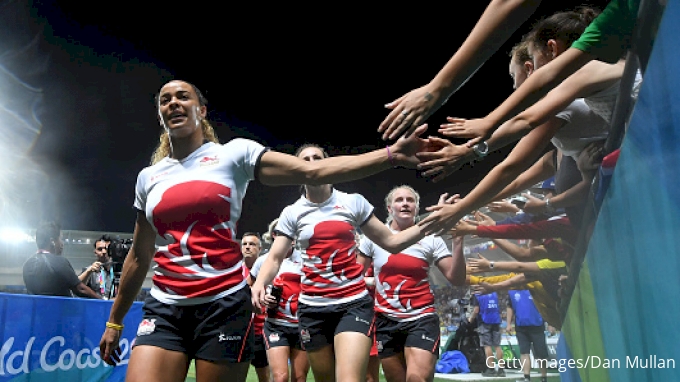If A Policy Doesn't Exist, You're Implying You Have No Place For Mothers
If A Policy Doesn't Exist, You're Implying You Have No Place For Mothers
England's Deborah Wills believes the more women who decide to return after having a baby, the stronger the argument for policies suited to female athletes.

Female athletes having children during their sporting careers is becoming more and more commonplace, especially in sports such as athletics. However, rugby still sees relatively few mothers on the pitch.
Unlike football’s Women’s Super League, the Premier 15s does not yet have a formal league-wide maternity policy, and it’s done on a club-by-club basis. Unsurprisingly, the number of mothers in the Premier 15s is few and far between.
One such player who returned to the field a remarkable 17 weeks after giving birth is Deborah Wills (née Fleming).
The former England Sevens player with over 100 appearances, gives her perspective on deciding to have a baby mid-career to returning postpartum and why other players should know it’s an option.
“When England Sevens disbanded during COVID, it was a chance to spend time with my husband when I wasn’t traveling on the World Series,” said the 31-year-old Willis. “For me, personally, I enjoyed that time, living a slower pace of life and being with my family. That made us start the conversation of having a baby, but with the postponement of the Olympics, my focus turned back to making the Team GB squad and going to Tokyo.
“When the Olympics was over, I personally felt like I’d done everything child-Deborah had set out to do. I was an Olympian. I’d been to a Commonwealth Games. I thought now was the perfect time to try, and if I never returned to the field, I’d not have any resentment.
“I also felt that if I continued training and attempting to make the squad for Paris 2024, squad selection can be very intense and subjective, and it changes with different coaches. I was scared of jumping back on the crazy roller coaster and in 2024 not getting selected and looking back on the last three years and again being regretful that I’d given up those years of possibly having a child.
“Fertility is also such an unknown. Are you going to be able to conceive? Will it take years? Or will we struggle and need to have additional help?”
The planning behind having a baby, conceiving in a specific time frame and taking time out of the game are challenges to contend with for sportswomen, as written about by former England forward Shaunagh Brown, who recently retired from the game.
For Wills and her husband, the journey began in September 2021.
“I knew I was pregnant very early, probably in the first two weeks – as soon as I missed my period. I called Jo Yapp (Worcester Warriors head coach) and told her. I said I wanted to step back from the squad and enjoy some privacy. I wanted to step back without the excess noise and control the narrative, so I asked Jo to say to other players that I had decided to rehab.
“I then decided to do as much research as I could around training and pregnancy. I wrote all my own programs for pregnancy and postpartum and returned myself back to full fitness.
“I’m qualified in personal training and have had a lot of S&C training throughout my career. I was still running on rugby pitches at 28 weeks and doing repeated tempo runs. The joy of pregnancy is, no one can tell you when you need to stop, you have to listen to your body, and you will just know.
“At the session at 28 weeks, I looked down the rugby pitch, and I remember thinking ‘this is it, my core can’t take this anymore,’ so I switched to doing cardio stuff on the cross trainer with weights, and my last training session was two days before I gave birth.”

Wills was back running by Week 4 of her postpartum journey and returned to Worcester only two weeks later to complete the preseason activities. After spending time away from running into people, and used to having a bump, building into contact sessions was important.
“I hadn’t been vocal at the club about being pregnant or having a baby, so to some of the girls, I was just a player who had rocked up at the beginning of a new season.
“In one of my first sessions back, we were doing a one-on-one bag-hit drill, and you were meant to drop and touch the players hips, and one player dropped her shoulder into my stomach. I was like ‘oh OK,’ and it just felt so weird. We laugh about it now. I just felt different around the pelvis area when everything was still settling. I was back doing full contact at 11 weeks.
“My first game back was in the Allianz Cup against Exeter, and I ended up playing 80 minutes. It was a hot day, and I was blowing, but loved it. I’ve been very fortunate with the players and support staff being so patient with me and understanding that I was coming to training tired, as you don’t sleep at night. Also, I was having to breast pump around the players and coaches.
“With breastfeeding, I had to be really organized. I bought an electric pump, and I’d pump in the car as soon as I got to training or go to a free room. As soon as the sessions were over, I’d start pumping again, as well as in some team meetings. The girls have just been so supportive.”
The season has begun 🫶🏾 pic.twitter.com/e9g55ZgBOS
— Deborah Wills (née Fleming) (@DeborahF91) September 25, 2022
With mothers at the higher levels of the sport still scarce, Wills is keen to share her story and give advice.
“My advice to any female athletes considering having a baby at any point in their career is you have to do what makes you happy and what’s best for your family. We play sport for such a short period of our lives, and now the beauty of it is there’s so many athletes from different sports around the world who are returning post-baby, so it is something that is possible.”
Role models also play an important part in showing female players that you don’t have to wait until your career is over.
Wills lists Australia Sevens players Alicia Lucas and Emilee Cherry as her inspiration for the timing of having a baby and returning to the field, alongside Annette Bevan who plays for Abbey RFC women and started an Instagram page @postpartumrugbymum. It’s dedicated to documenting her journey back to the field after childbirth in an honest and open way, creating a support network for others doing the same.
“These women have shown that it is possible, and not only that, you can come back to the same level and higher. In the last 10 years, there are examples of women who are changing the story for future athletes when they decide to have babies, because there is so much more than having the child and spending time away. It’s contractual agreements with sponsors and national governing bodies, with the teams you’re affiliated with and being able to make a living. Then, there’s the performance side, so it’s really important to take that into consideration when planning your babies.
“If a suitable maternity policy does not exist, without openly saying it, you’re implying that there is no place for mothers in your team or organization.”
Wills believes that the more women who decide to return after having a baby, the stronger the argument for policies suited to female athletes within all contracts and not a copy and paste policy, replicating your average desk worker.
“The contracts need to be performance-based for an athlete, which has their return in mind, and I also think it’s important to remind women that it is still their shirt to come back to and they haven’t lost it. It’s all about recognizing that they’re rugby players and the demands of our jobs.
“When there is a maternity policy in place, not only does it provide safety and security, it also makes having a baby mid-career more normal and less taboo, and that’s what we want to see.”

Current England 15s players who are on fixed-term contracts with the RFU do not have bespoke maternity policies and are entitled to the same leave and statutory pay as a female RFU employee.
An updated England women’s policy is due to be released at the end of January/early February this year, with Wills involved in the process through the RPA representation group.
The RFU has said it will work with Premier 15s clubs moving forward to share good practice and support in developing their own policies and strategies moving forwards.
“I’m proud to say I was a part of the new policy for elite female rugby players in England,” Willis said. “If this shifts the momentum of these women taking time out to have a baby in the coming years, it’ll be very interesting to see.”